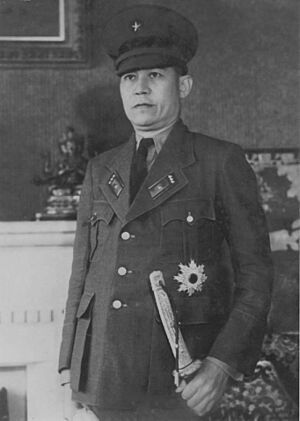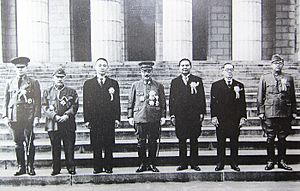Ba Maw facts for kids
Quick facts for kids
Ba Maw
|
|
|---|---|

Ba Maw having just been awarded the Order of the Rising Sun, March 1943
|
|
| Head of State (Naingandaw Adipadi) | |
| In office 1 August 1943 – 19 August 1945 |
|
| Preceded by | Position established |
| Succeeded by | Position abolished |
| 1st Premier of British Crown Colony of Burma | |
| In office 1937–1939 |
|
| Preceded by | position established |
| Succeeded by | Maung Pu |
| Personal details | |
| Born | 8 February 1893 Maubin, Burma Province, British India |
| Died | 29 May 1977 (aged 84) Rangoon, Burma |
| Political party | Poor Man's Party (1935–1939) Freedom Bloc (1939–1944) Mahabama Party (1944–1948) |
| Spouse |
Khin Ma Ma Maw
(m. 1926; died 1967) |
| Relations | Ba Han (brother) Bo Yan Naing (son-in-law) Ye Htoon (son-in-law) |
| Children | 7 including: Zali Maw, Binnya Maw, Banya Maw, Onma Maw and Tinsa Maw |
| Parents | Shwe Kye (father) Thein Tin (mother) |
| Alma mater | Rangoon College (B.A.) University of Calcutta (M.A.) University of Cambridge (LL.M.) University of Bordeaux (Ph.D.) |
| Occupation | Lawyer, politician |
| Military service | |
| Allegiance | British Burma, State of Burma, Myanmar |
Ba Maw (born February 8, 1893 – died May 29, 1977) was an important Burmese lawyer and political leader. He was active during the time between the two World Wars and during World War II. He served as the first Premier (leader) of British Burma from 1937 to 1939. Later, he became the head of the State of Burma from 1942 to 1945.
Contents
Early Life and Education
Ba Maw was born in Maubin, a town in Burma. His family was well-known and had both Mon and Burman heritage. His father, Shwe Kye, was a Mon man who spoke French and English. He worked as a diplomat for the Burmese royal family. Ba Maw's older brother, Ba Han, was also a lawyer and scholar. He served as the Attorney General of Burma.
Ba Maw was raised as a Christian. However, he later became a Buddhist. This helped him gain support from the Buddhist people of Burma.
He studied at Rangoon College and earned a Master of Arts degree from the University of Calcutta in 1917. He then went to Cambridge University in England to study law. He also earned a doctoral degree from the University of Bordeaux in France. For his doctoral paper, Ba Maw wrote about different parts of Buddhism in Burma.
Academic Career
After finishing college in 1913, Ba Maw started working as a teacher. He taught at Rangoon Government High School and later at ABM school. In 1917, he became the first English lecturer at Rangoon University. He worked there for four years.
Law Career
In the 1920s, Ba Maw began working as a lawyer. He also started to get involved in politics in British Burma. He became well-known in 1931 when he defended Saya San. Saya San was a rebel leader who started a tax revolt against British rule. The revolt grew into a larger rebellion.
Saya San was captured and put on trial. Ba Maw was the main lawyer defending Saya San and other rebel leaders. Ba Maw believed the government was unfairly punishing villagers who couldn't pay their taxes.
Politics
British Burma Leader
In 1934, Ba Maw became the education minister. Then, in 1937, he became the Premier of Burma under a new constitution. In July 1940, Ba Maw left his position in the government. He stated that Burma should not take part in World War II unless it gained its freedom. Because of this, he was arrested in August 1940 for breaking the Defence of Burma Rules. He was sentenced to one year in prison. He was first jailed in Mandalay and later moved to Mogok.
Ba Maw felt that his trial was just a formality. He believed the real drama was happening outside, where people were showing more pride in their race and challenging British rule.
Burma During Japanese Occupation

On April 13, 1942, Ba Maw escaped from prison during a festival. He and his wife, Khin Ma Ma Maw, hid in the hills. In May, they made contact with the Japanese forces who had occupied Burma. On June 4, Ba Maw was made the Chief Civilian Administrator by the Japanese. Aung San agreed to reorganize the Burmese Independence Army as the Burma Defense Army. On August 1, 1942, Ba Maw became the head of the Burmese government.
As the war started to go badly for Japan, they decided to grant Burma independence. They hoped this would make the Burmese people fight harder against the Western powers. It would also give Japan more military and economic support from Burma. A committee led by Ba Maw was formed in May 1943 to prepare for independence.
The State of Burma was officially declared independent on August 1, 1943. Ba Maw became the "Naingandaw Adipadi" (head of state) and prime minister. The new state quickly declared war on the United Kingdom and the United States. It also made an alliance with Japan. Ba Maw attended the Greater East Asia Conference in Tokyo in November 1943. There, he spoke about how Asian countries should unite for peace.
Some Japanese military officers were not happy with Ba Maw. They secretly planned to replace him with another leader, U Nu. However, U Nu did not agree with the plan and told Ba Maw about it. This made Ba Maw distrust his Japanese allies, but he decided to keep working with them. He believed that ensuring Burma's independence from the British Empire was the most important goal.
During this time, some Japanese soldiers supported the idea of bringing back the Burmese monarchy. They thought a puppet king, like in Manchukuo, would be easier for them to control. They favored Taw Phaya Gyi, the grandson of the last Burmese king, Thibaw. He was young and had no political experience, which made him seem easy to control.
However, the new Burmese state did not gain much support from the people or other countries. This was because the Japanese army was still present and active. Also, the Burma Independence Army, who had been working with the Japanese, switched sides to the Allies. Because of this, Ba Maw's government collapsed.
Ba Maw fled to Japan through Thailand as British forces advanced. He was later captured by American authorities and held in prison until 1946.
Independent Burma
After Burma became independent from the United Kingdom, Ba Maw was allowed to return. When he came back in August 1946, Aung San invited him to join the new government. However, Ba Maw refused. Instead, he restarted his Mahabama Party to be an opposition group. He remained active in politics.
He was briefly jailed in 1947, suspected of being involved in the assassination of Aung San, but was soon released. Later, when General Ne Win took power in 1963, Ba Maw was imprisoned again. He was held without charge or trial from about 1965 or 1966 until February 1968. While in prison, Ba Maw managed to secretly send out a manuscript of his memories from the war years.
He never held a political office again. His book, Breakthrough in Burma: Memoirs of a Revolution, 1939–1946, was published in 1968. It tells about his role during the war. Ba Maw died in Rangoon on May 28, 1977.
Family
Ba Maw married Khin Ma Ma Maw on April 5, 1926. They had seven children together, including Binnya Maw and Tinsa Maw. His daughter Tinsa Maw married Bo Yan Naing, one of the famous Thirty Comrades, in June 1944.
 | Toni Morrison |
 | Barack Obama |
 | Martin Luther King Jr. |
 | Ralph Bunche |

